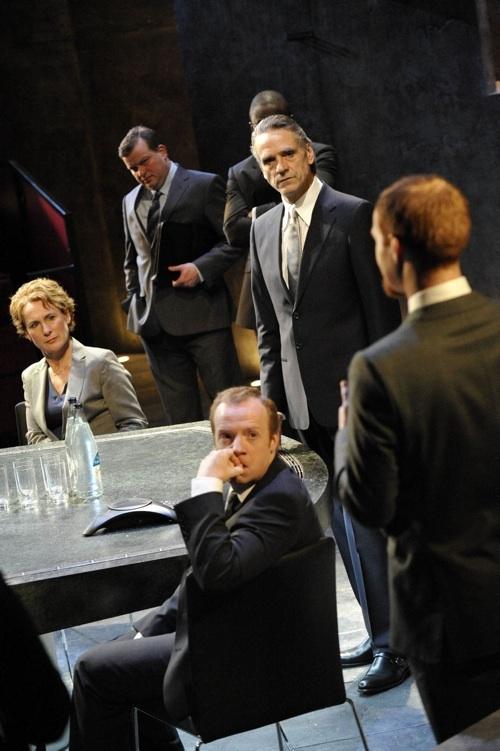Why is it that Method-ist actors are pretty much expected to spend months manically researching the inner minutiae of their character, but a much-lauded playwright can get away without providing any serious insights into his main subject matter?
To anyone with even the slightest inkling of how modern businesses work – that is, just about anyone older than Kevin the token teenager – it is insulting, not to mention boring, to have to sit through three-and-a-half hours of such poorly developed material as Dennis Kelly’s new play about a global business mogul going bonkers in the boardroom, and the ensuing fall-out.
Nothing wrong with an imaginative writer thinking outside the box – after all, The Sunday Times allegedly once asked novelist Anita Brookner to fly to Vegas to cover a Mike Tyson prize fight – but this is ridiculous, the sort of thing Tariq Ali might have dreamed up in the early Eighties after reading the collected works of Edward Bond and Howard Barker at a single sitting.
Riffing off Shakespeare is always a good wheeze, and Kelly’s stated intention of reinterpreting King Lear via Kurosawa’s masterpiece Ran sounded on paper like a great proposition. Tempting a big beast like Jeremy Irons back to the RSC after a 23-year absence to play the lead role, aided by a very solid company cast and the always-reliable technical crew of the RSC itself made one think of buying shares into a really blue chip affair.
However, the unrelentingly long, shouty-sweary boardroom scene which takes up almost the entire first act seems to have been inspired more by the over-the-top tongue-in-cheek televised “corporate camp” of the BBC’s Dragons’ Den, and leaves one longing for the tightly coiled, well plotted misanthropy of just about anything by David Mamet or Neil LaBute.
And for all its swiftly efficient exposition of the relative tensions and feuds inside the boardroom of Argeloin (think Enron meets News Corp out of Dynasty), the shallow, cartoonish nature of most of the characters and their respective motivations is so lacking in nuance that you just want to fast-forward to the next scene after a few minutes. Yet this wasn’t cheap television but high-value theatre, and unlike the droves who left in the interval, your reviewer had to sit this out with clenched teeth.
Jeremy Irons’ languid patrician manner – so well suited to playing Harold Macmillan or the more sinister socialite Claus von Bülow – makes him in some ways an odd choice to play Colm, a brutal, hard-nosed wretch of a man who has built up his own fortunes by deliberately destroying those of his colleagues and even his friends.
He appears like a throwback from a pre-Thatcher era, surrounded by socially less elevated boardroom fodder whom he despises almost as much as his wimp of a son, Jimmy (played with passive, and then finally active aggression by Luke Norris), and it is only in the scenes with Joanna Horton’s gritty, salt-of-the-earth Barbara, a sort of Chav Cordelia to his loftier Lear, that Irons gets to employ all his chops.
The knock-on effects of Colm’s abdication of authority - his psychotic breakdown leads him to split his business empire between Richard, the snivelling boardroom beta male (a perfectly toxic Jonathan Slinger), and the emotionally uptight martinet Catherine (a blazing-eyed Helen Schlesinger), and to a violent falling out with his son – erupt in a scarcely explained state of all-out civil war. As his former employees turn into urban guerrillas, the dazed former patriarch stumbles upon the humble bedsit of the apparent stranger Barbara, who nurses him back to health (lying on what appears to be one of the sofas from The Royle Family), turning down with magnificent indignation the wad of notes offered her by Colm's erstwhile Argeloin henchman from Hell, Castile (an impressive John Stahl).
The second act takes place in a rural, increasingly pastoral environment and seems to feed on Cormac McCarthy’s masterful book The Road for key elements of societal breakdown. Between various somewhat pointless and repetitive skirmishes and pitched battles between the rival (and endlessly changing) forces of Richard and Catherine, Colm-Lear and Cordelia-Barbara tentatively renegotiate their own identities and personal histories, to effect a touching final rapprochement.
Horton is consistently superb, investing endless degrees of emotion into the play's only sympathetic character, a rough diamond who was handed a very raw deal. The frequently scratchy-tempered comic interludes between this odd couple, punctuated by Colm’s final epiphany and Barbara’s resolute self-sacrifice, are a welcome contrast to the bombast and monotony of the first act.
Naomi Dawson’s sets work a treat – the boardroom table which gradually descends in height, and which in the final scene turns into a Narnia-like sacrificial slaughter slab, complete with blood trickling down is a haunting visual contrivance. The combined effect of the psychedelic-era video and projections (by Ian William Galloway and Finn Ross) and Carolyn Downing’s disturbing sound is suitably psychotic, although most of the time there is far more noise and bombast and running about on stage than is necessary to convey the play's underlying themes.















Add comment